Share
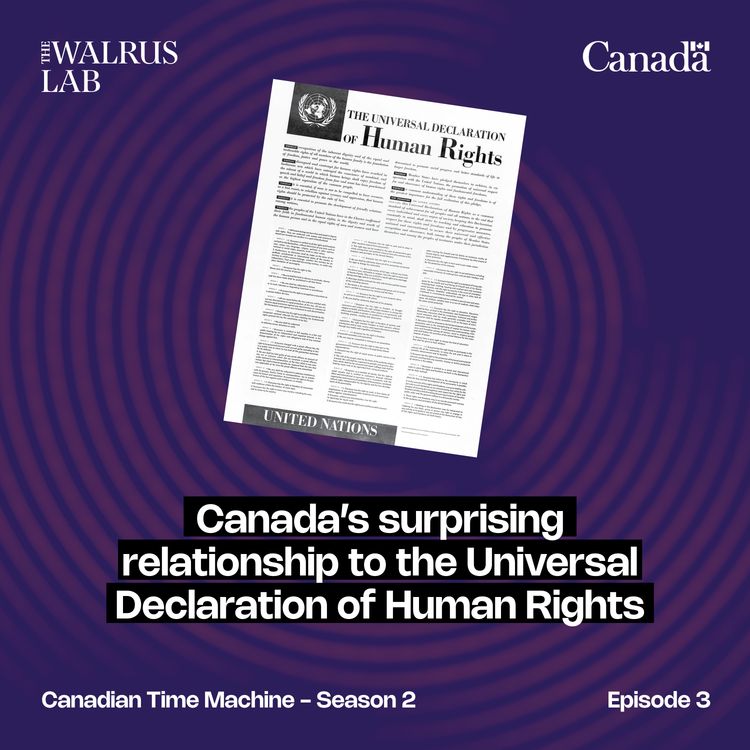
Canadian Time Machine
Canada’s surprising relationship to the Universal Declaration of Human Rights
In 1947, Canadian lawyer John Peters Humphrey worked with other members of the Commission on Human Rights to write the first draft of the Universal Declaration of Human Rights. On December 10, 1948, it was adopted by the UN General Assembly in Paris. It’s been over 75 years since this definitive moment, one in which world leaders pledged to do everything in their power to prevent the horrors of World War II from happening again. The Declaration consists of 30 Articles declaring everyone’s equal rights, including those of life, liberty, freedom of movement, and freedom of expression. While there’s a lot to celebrate on this anniversary, it’s also an opportunity to have an honest conversation about the current state of human rights, both around the world, and in Canada. In this episode, human rights historian Dr. Jennifer Tunnicliffe helps us understand the impacts of the Declaration. Hereditary Chief Na’Moks of the Wet'suwet'en Nation also shares his perspective on human rights in Canada, particularly in relation to the treatment of Indigenous peoples.
To read the episode transcripts in French and English, and to learn more about historic Canadian milestones, visit thewalrus.ca/canadianheritage.
This podcast receives funding from The Government of Canada and is produced by The Walrus Lab.
Check out the French counterpart podcast, Voyage dans l'histoire canadienne.
--
Le lien surprenant qui unit le Canada et la Déclaration universelle des droits de l'homme
En 1947, l’avocat canadien John Peters Humphrey sur la première ébauche de la Déclaration universelle des droits de l'Homme avec les autres membres de la Commission des droits de l'homme. Le 10 décembre 1948, elle est adoptée par l’Assemblée générale des Nations Unies à Paris. 75 années se sont écoulées depuis ce moment décisif, où tous les dirigeants mondiaux se sont engagés à tout faire en leur pouvoir pour empêcher que ne se reproduisent à nouveau les horreurs de la Seconde Guerre mondiale.
La Déclaration comporte 30 articles déclarant que chacun a des droits égaux, que chacun a droit à la vie, à la liberté, à la liberté de circulation et à la liberté d’expression. Alors qu’il y a beaucoup à célébrer en cet anniversaire, il s’agit aussi d’une occasion d’entamer une réflexion sur l’état actuel des droits de la personne, ailleurs dans le monde et au Canada.
Dans cet épisode, Jennifer Tunnicliffe, une historienne des droits de la personne, nous aide à mieux comprendre les effets de la Déclaration. Le chef héréditaire Na'Moks de la nation Wet'suwet'en nous partage sa réflexion sur l’approche des droits de la personne au Canada, en lien avec les traitements subis par les peuples autochtones.
Pour lire les transcriptions des épisodes en français et en anglais, et pour en savoir plus sur les jalons historiques canadiens, veuillez visiter le site thewalrus.ca/canadianheritage.
Ce balado reçoit des fonds du gouvernement du Canada et est produit par The Walrus Lab.
Découvrez le balado en français, Voyage dans l'histoire canadienne.
More episodes
View all episodes

7. The Furry Gold of Canada: The Beaver’s 50-Year Legacy
30:43||Season 4, Ep. 7Fifty years ago, Canada made the beaver an official national symbol. But long before that, this little animal was shaping rivers, driving trade, and quietly transforming the land.Wildlife ecologist Dr. Glynnis Hood and Jan Kingshott, director of animal welfare at Aspen Valley Wildlife Sanctuary, take us inside the beaver’s world—from its role in the fur trade to its work as an ecosystem engineer today—and show why it remains one of Canada’s most remarkable and resilient symbols.To read the episode transcripts in French and English, and to learn more about historic Canadian milestones, please visit thewalrus.ca/canadianheritage.This podcast receives funding from The Government of Canada and is produced by The Walrus Lab.Check out the French counterpart podcast, Voyages dans l'histoire canadienne.--Le trésor canadien : 50 ans du castorIl y a cinquante ans, le castor est devenu officiellement un symbole national du Canada. Mais bien avant cela, ce petit animal façonnait déjà les rivières, alimentait le commerce et transformait discrètement le paysage.La biologiste spécialisée en faune Dr. Glynnis Hood et Jan Kingshott, directrice du bien-être animal au Sanctuaire faunique Aspen Valley, nous font découvrir l’univers du castor — de son rôle dans la traite des fourrures à son impact écologique aujourd’hui — et expliquent pourquoi il demeure l’un des symboles les plus fascinants et résilients du Canada.Pour lire les transcriptions des épisodes en français et en anglais, et pour en savoir plus sur les jalons historiques canadiens, veuillez visiter le site thewalrus.ca/canadianheritage.Ce balado reçoit des fonds du gouvernement du Canada et est produit par The Walrus Lab.Découvrez le balado en français, Voyages dans l'histoire canadienne.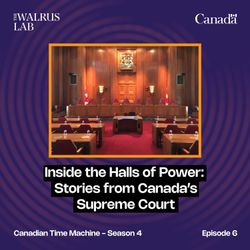
6. Inside the Halls of Power: Stories from Canada’s Supreme Court
31:19||Season 4, Ep. 6Founded in 1875, the Supreme Court of Canada has shaped the country for 150 years—yet the stories behind its decisions, its building, and the people who have walked its halls often remain out of view. To mark this milestone, Canadian Time Machine goes beyond the headlines and into the quieter, more surprising corners of Canada’s highest court.Angela sits down with filmmaker and lawyer Étienne Trépanier, whose new project reimagines how Canadians might experience the Court at a moment of major change. Then, former Chief Justice Beverley McLachlin reflects on the institution she helped guide for nearly two decades, offering rare insight into what makes the Supreme Court both uniquely Canadian and profoundly human.To read the episode transcripts in French and English, and to learn more about historic Canadian milestones, please visit thewalrus.ca/canadianheritage.This podcast receives funding from The Government of Canada and is produced by The Walrus Lab.Check out the French counterpart podcast, Voyages dans l'histoire canadienne.--Les coulisses de pouvoir: l’histoire de la Cour suprême du CanadaFondée en 1875, la Cour suprême du Canada façonne le pays depuis 150 ans. Pourtant, les histoires derrière ces décisions, son édifice et les personnes qui y ont marché restent souvent méconnues. Pour souligner cet anniversaire, Canadian Time Machine explore les recoins plus surprenants et méconnus de la plus haute instance judiciaire du pays. On rencontre le cinéaste et avocat Étienne Trépanier, dont le nouveau projet réinvente la façon dont les Canadiens peuvent vivre l'expérience de la Cour a un moment de grands changements. Ensuite, l’ancienne juge en chef Beverley McLachlin revient sur l’institution qu’elle a guidée pendant près de deux décennies, offrant un aperçu rare de ce qui rend la Cour suprême à la fois profondément humaine et résolument canadienne. Pour lire les transcriptions des épisodes en français et en anglais, et pour en savoir plus sur les jalons historiques canadiens, veuillez visiter le site thewalrus.ca/canadianheritage.Ce balado reçoit des fonds du gouvernement du Canada et est produit par The Walrus Lab.Découvrez le balado en français, Voyages dans l'histoire canadienne.
5. 25 Years of Recognition: From the Benefits Act to Today’s Fight for Equality
23:22||Season 4, Ep. 5In 2000, Canada passed the Modernization of Benefits and Obligations Act—a landmark law that formally recognized same-sex couples under federal statutes, a quiet but powerful shift that changed how queer relationships were seen and protected. In this episode, we meet writer and performer Steen Starr, whose art and activism captured the spirit of the time, and former MP Libby Davies, who was in Parliament when the Act was passed. Together, they reflect on the debates that shaped this milestone and the freedoms that came from it.To read the episode transcripts in French and English, and to learn more about historic Canadian milestones, please visit thewalrus.ca/canadianheritage.This podcast receives funding from The Government of Canada and is produced by The Walrus Lab.Check out the French counterpart podcast, Voyages dans l'histoire canadienne.--25 ans de reconnaissance : les couples de même sexe et la route vers l’égalitéEn 2000, le Canada adoptait une loi historique qui reconnaissait enfin les couples de même sexe dans les textes fédéraux, un changement à la fois discret et profond, qui a transformé la façon dont les relations queer étaient vues et protégées. Dans cet épisode, on rencontre l’autrice et artiste Steen Starr, dont l’art et le militantisme ont marqué cette période, ainsi que l’ancienne députée Libby Davies, qui était au Parlement lors de l’adoption de la loi. Ensemble, elles reviennent sur ce tournant majeur et sur les libertés qui en ont découlé.Pour lire les transcriptions des épisodes en français et en anglais, et pour en savoir plus sur les jalons historiques canadiens, veuillez visiter le site thewalrus.ca/canadianheritage.Ce balado reçoit des fonds du gouvernement du Canada et est produit par The Walrus Lab.Découvrez le balado en français, Voyages dans l'histoire canadienne.
4. Canada’s Unknown Soldier: 25 Years of Remembrance
29:02||Season 4, Ep. 4Twenty-five years ago, the remains of an unidentified Canadian soldier were brought home from France and laid to rest at Ottawa’s National War Memorial. The Tomb of the Unknown Soldier has since become one of our country’s most meaningful sites of remembrance.In this episode, artist and sculptor Mary Ann Liu, who designed the tomb, shares the vision and symbolism behind her work. Then, Dr. Stacey Barker, Historian of Arts and Military History at the Canadian War Museum, helps us trace the tomb’s origins and lasting significance. Together, they reveal how this monument continues to honour the sacrifices of those who served—and the values that unite generations of Canadians.To read the episode transcripts in French and English, and to learn more about historic Canadian milestones, please visit thewalrus.ca/canadianheritage.This podcast receives funding from The Government of Canada and is produced by The Walrus Lab.Check out the French counterpart podcast, Voyages dans l'histoire canadienne.--Le Soldat inconnu du Canada : 25 ans de mémoireIl y a vingt-cinq ans, les restes d’un soldat canadien non identifié ont été rapatriés de France et inhumés au Monument commémoratif du Canada à Ottawa. Depuis, la Tombe du Soldat inconnu est devenue l’un des symboles les plus puissants du souvenir au pays.Dans cet épisode, l’artiste et sculptrice Mary Ann Liu, conceptrice de la tombe, partage la vision et les symboles qui inspirent son œuvre. Puis, l’historienne Stacey Barker, spécialiste de l’art et de l’histoire militaire au Musée canadien de la guerre, nous aide à retracer les origines et la portée durable de ce monument. Ensemble, elles explorent la manière dont la Tombe du Soldat inconnu continue d’honorer le sacrifice de ceux et celles qui ont servi — et les valeurs qui unissent les générations de Canadiens et de Canadiennes.Pour lire les transcriptions des épisodes en français et en anglais, et pour en savoir plus sur les jalons historiques canadiens, veuillez visiter le site thewalrus.ca/canadianheritage.Ce balado reçoit des fonds du gouvernement du Canada et est produit par The Walrus Lab.Découvrez le balado en français, Voyages dans l'histoire canadienne.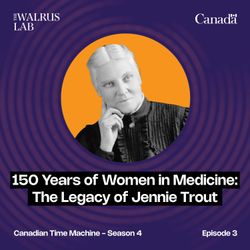
3. 150 Years of Women in Medicine: The Legacy of Jennie Trout
24:57||Season 4, Ep. 3In this episode of Canadian Time Machine, we mark 150 years since Jennie Trout became the first woman licensed to practice medicine in Canada—a breakthrough that helped open the doors of the profession to women across the country. We hear from historian Heather Stanley about Trout’s fight for education and equality, and from Dr. Ramneek Dosanjh, a physician and advocate for equity in healthcare, on the legacy of her achievement. Together, they trace how one woman’s determination helped shape 150 years of progress in Canadian medicine.To read the episode transcripts in French and English, and to learn more about historic Canadian milestones, please visit thewalrus.ca/canadianheritage.This podcast receives funding from The Government of Canada and is produced by The Walrus Lab.Check out the French counterpart podcast, Voyages dans l'histoire canadienne.--150 ans depuis Jennie Trout : pionnière de la médecine au CanadaDans cet épisode de Canadian Time Machine, nous célébrons les 150 ans depuis que Jennie Trout a ouvert la voie aux femmes dans la médecine canadienne, devenant la première femme autorisée à exercer dans le pays. L’historienne Heather Stanley revient sur son combat pour l’éducation et l’égalité, tandis que la Dre Ramneek Dosanjh, médecin et militante pour l’équité en santé, explique comment cet héritage continue d’inspirer et de transformer la profession. Ensemble, elles retracent l’impact durable d’une pionnière dont la détermination a façonné un siècle et demi de progrès en médecine au Canada.Pour lire les transcriptions des épisodes en français et en anglais, et pour en savoir plus sur les jalons historiques canadiens, veuillez visiter le site thewalrus.ca/canadianheritage.Ce balado reçoit des fonds du gouvernement du Canada et est produit par The Walrus Lab.Découvrez le balado en français, Voyages dans l'histoire canadienne.
2. Oscar Peterson at 100: The Heart of Canadian Jazz
26:27||Season 4, Ep. 2In this episode of Canadian Time Machine, we explore the life, music, and legacy of jazz legend Oscar Peterson on what would have been his 100th birthday. We hear from jazz pianist Taurey Butler about the profound influence Peterson has had on his own music. Then we meet Kelly Peterson, Oscar’s wife and trustee of his estate, who shares personal stories and insights into the man behind the music. Featuring the performances of both Oscar and Taurey, this episode celebrates a Canadian icon whose joy, artistry, and advocacy continue to inspire musicians and audiences around the world.To read the episode transcripts in French and English, and to learn more about historic Canadian milestones, please visit thewalrus.ca/canadianheritage.This podcast receives funding from The Government of Canada and is produced by The Walrus Lab.Check out the French counterpart podcast, Voyages dans l'histoire canadienne.--Les 100 ans d'Oscar Peterson : le coeur du jazz canadienDans cet épisode de Voyages dans l’histoire canadienne, nous plongeons dans la vie, la musique et l’héritage du légendaire pianiste de jazz Oscar Peterson, à l’occasion de ce qui aurait été son 100e anniversaire. Le pianiste de jazz Taurey Butler raconte l’influence profonde que Peterson a eue sur sa propre musique. Puis, nous rencontrons Kelly Peterson, l’épouse d’Oscar et administratrice de sa succession, qui partage des souvenirs personnels et des témoignages éclairants sur l’homme derrière la musique. Avec des prestations d’Oscar et de Taurey, cet épisode rend hommage à une icône canadienne dont la joie, le talent et l’engagement continuent d’inspirer les musiciens et le public partout dans le monde.Pour lire les transcriptions des épisodes en français et en anglais, et pour en savoir plus sur les jalons historiques canadiens, veuillez visiter le site thewalrus.ca/canadianheritage.Ce balado reçoit des fonds du gouvernement du Canada et est produit par The Walrus Lab.Découvrez le balado en français, Voyages dans l'histoire canadienne.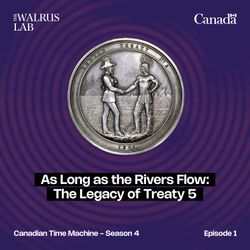
1. As Long as the Rivers Flow: The Legacy of Treaty 5
20:58||Season 4, Ep. 1“Treaty is powerful. It's not just a document or an agreement of the past. It's a living agreement,” says Cree lawyer and advocate Deanne Kasokeo. For nearly 150 years, Treaty 5 has shaped the lives of Cree and Anishinaabe communities across northern Manitoba and Saskatchewan—and its story is far from settled. Also called the Winnipeg Treaty, it included more First Nation communities than any other in Canada and promised land, tools, education, and health care. In practice, those agreements have been unevenly realized, and communities continue to navigate their impacts today. In this episode, Kasokeo shares how her family history and her grandmother’s teachings drive her to defend treaty rights and reconnect communities with their heritage. Then, Chief Maureen Brown of Opaskwayak Cree Nation reflects on the long-term effects of colonial policies, the importance of passing knowledge to the next generation, and why she remains hopeful for the future.To read the episode transcripts in French and English, and to learn more about historic Canadian milestones, please visit thewalrus.ca/canadianheritage.This podcast receives funding from The Government of Canada and is produced by The Walrus Lab.Check out the French counterpart podcast, Voyages dans l'histoire canadienne.--Aussi longtemps que coulera la rivière : L’héritage du Traité numéro 5« Le Traité numéro 5 est un outil puissant. Ce n’est pas simplement un document ou un accord du passé. C’est un document vivant, » affirmait l’avocate et défenseure des droits des peuples cris, Deanne Kasokeo. Depuis 150 ans, il façonne la vie des peuples cris et anichinabés du nord du Manitoba et de la Saskatchewan, et cette question demeure loin d’être résolue. Également connu sous le nom de Traité de Winnipeg, il a impliqué le plus grand nombre de communautés des Premières Nations au Canada, offrant des promesses de terres, d’outils, d’éducation et de soins de santé. Cependant, ces engagements ont été mis en œuvre de manière inégale. Les communautés des Premières Nations continuent de subir les conséquences au quotidien. Dans cet épisode, Deanne Kasokeo nous parle de l’histoire de sa famille et de l’impact des enseignements de sa grand-mère sur son engagement à défendre les droits issus des traités, tout en œuvrant pour reconnecter les communautés à leur héritage. Ensuite, la cheffe Maureen Brown de la Nation crie d’Opaskwayak partage ses réflexions sur les effets à long terme des politiques coloniales, l’importance de la transmission des savoirs aux nouvelles générations et les raisons qui nourrissent son optimisme pour l’avenir.Pour lire les transcriptions des épisodes en français et en anglais, et pour en savoir plus sur les jalons historiques canadiens, veuillez visiter le site thewalrus.ca/canadianheritage.Ce balado reçoit des fonds du gouvernement du Canada et est produit par The Walrus Lab.Découvrez le balado en français, Voyages dans l'histoire canadienne.
Introducing Canadian Time Machine: Season 4
01:17||Season 4From the fight for LGBTQ+ rights to the birth of Canada’s highest court, from trailblazing women in medicine to the legacy of treaties—these are the turning points that shaped the nation.It's all in season four of Canadian Time Machine – a podcast that unpacks key milestones in our country’s history.To read the episode transcripts in French and English, and to learn more about historic Canadian milestones, please visit thewalrus.ca/canadianheritage.This podcast receives funding from The Government of Canada and is produced by The Walrus Lab.Check out the French counterpart podcast, Voyages dans l'histoire canadienne.--De la lutte pour les droits LGBTQ+ à la création de la plus haute cour du Canada, des femmes pionnières en médecine à l’héritage des traités—autant de moments décisifs qui ont façonné notre nation.Retrouvez-les dans la quatrième saison de Canadian Time Machine, un balado qui explore les moments clés de l’histoire de notre pays.Pour lire les transcriptions des épisodes en français et en anglais, et pour en savoir plus sur les jalons historiques canadiens, veuillez visiter le site thewalrus.ca/canadianheritage.Ce balado reçoit des fonds du gouvernement du Canada et est produit par The Walrus Lab.Découvrez le balado en français, Voyages dans l'histoire canadienne.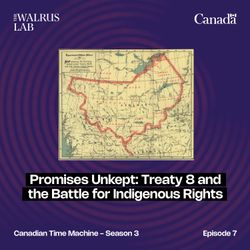
7. Promises Unkept: Treaty 8 and the Battle for Indigenous Rights
31:20||Season 3, Ep. 7125 years after the signing of Treaty 8, many of the promises made to Canada's northern First Nations remain unfulfilled. In this episode, we explore the history, impact, and ongoing struggles surrounding one of Canada’s largest treaties. Charmaine Willier-Larsen, a descendant of a Treaty 8 signatory, shares how reconnecting with her heritage led her to create the Bannock n Bed, a cultural inn just two kilometres where the treaty was signed on Lesser Slave Lake in 1899. We also hear from Grand Chief Trevor Mercredi of Treaty 8 First Nations of Alberta, who breaks down the treaty’s original promises, the systemic barriers that persist, and the fight to uphold Indigenous rights.To read the episode transcripts in French and English, and to learn more about historic Canadian milestones, please visit thewalrus.ca/canadianheritage.This podcast receives funding from The Government of Canada and is produced by The Walrus Lab.Check out the French counterpart podcast, Voyages dans l'histoire canadienne.--Au-delà des promesses : Le traité numéro 8 et les droits des peuples autochtonesPlus de 125 ans après la signature du traité numéro 8, de nombreuses promesses faites aux Premières Nations du Nord demeurent toujours non tenues. Dans cet épisode, nous plongeons dans l’histoire, l’impact et les défis persistants liés à l’un des traités les plus significatifs du Canada. Charmaine Willier-Larsen, descendante d'un des signataires du traité numéro 8, nous raconte comment cet héritage l’a inspirée à fonder The Bannock n Bed, une auberge culturelle située à seulement deux kilomètres du site où le traité a été signé, près du Petit lac des Esclaves en 1899. Nous accueillons également le grand chef Trevor Mercredi, des Premières Nations du traité numéro 8 de l'Alberta, qui revient sur les promesses faites dans le traité, les obstacles systémiques toujours présents et la lutte pour faire respecter les droits des peuples autochtones.Pour lire les transcriptions des épisodes en français et en anglais, et pour en savoir plus sur les jalons historiques canadiens, veuillez visiter le site thewalrus.ca/canadianheritage.Ce balado reçoit des fonds du gouvernement du Canada et est produit par The Walrus Lab.Découvrez le balado en français, Voyages dans l'histoire canadienne.